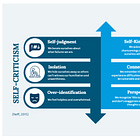Do you hustle through your days chasing perfection? Does the prospect of failing fill you with fear? Is feedback and criticism painful to hear? Then our research suggests you’re in good company with the pressure to perform perfectly physically, socially, emotionally and intellectually - while making it appear effortless - one of the defining requirements of ‘good girls’.
“When women believe their talents and abilities are fixed traits, it makes them more vulnerable,” explained Dr. Carol Dweck, one of the world’s leading researchers on motivation and mindsets, in this podcast. “When they find something difficult, experience a setback, or are given criticism, they worry people will find out they are permanently deficient. It’s exhausting.”
Carol calls this a ‘fixed mindset’, which is underpinned by the belief that we are born with a certain amount of talent and ability and cannot really improve upon it. For example, we’re either good at sports or clumsy, musical or tone deaf, smart or stupid. As a result, we tend to have a constantly judgmental and often self-critical monologue running inside our heads to assess how perfectly we are pulling things off.
“In contrast, when women believe their talents and abilities can be improved with effort and learning, it allows women to thrive even in threatening environments,” explained Carol. “This is because when they find themselves struggling or being given feedback, they see this as part of how everyone learns. It’s freeing.”
Carol calls this a ‘growth mindset,’ which is underpinned by the belief that while we are born with a certain amount of talent and ability, we can always improve upon it with effort and learning. As a result, we tend to have a more confident and self-compassionate monologue running inside our heads to help identify our learning opportunities.
When you already know you are deficient, you have nothing to lose by trying.
Carol suggests these beliefs exist along a continuum with different people and different situations, moving us more towards one mindset or the other. If we’re finding our ‘fixed mindset’ has us hustling for perfection in ways that are not serving us or others, she recommends:
Tuning in: Listen to the inner monologue in your head. Is it full of self-criticism or self-compassion? Is it telling you not to take on new challenges so you can’t fail and embarrass yourself? When you make a mistake, is it calling you stupid? When somebody gives you feedback, do you hear that you’re not good enough? When you see someone excelling, do you find it threatening?
Talking back: If you hear a lot of self-criticism, try to talk back to yourself like your wisest and kindest friend. Encourage yourself to take on that challenge. When you make a mistake, look for what you can learn. If someone offers you feedback, ask them for guidance on how you can do better. If you see someone else excelling, ask them if they could teach you how to do it.
Trying to grow: Each time you choose to invest in the effort and practice required to master new skills and new ways of being, you form stronger and stronger neural pathways in your brain. As long as you keep trying, you become more of the person you want to be over time, even amidst your struggles and setbacks.
For more growth mindset tips and tools listen to the podcast.
Please note: We are mindful that ‘girl’ and ‘woman’ are socially constructed ideas of gender that can fall painfully short of defining the fabulous complexity of who we each are. If these words resonate with part of how you have previously or currently identified yourself we’d love to hear about your lived experiences.















Share this post